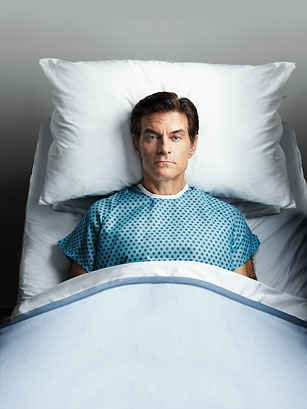
(3 of 4)
I called my wife Lisa from LaPook's office. She was very calm when I told her the news, but by the time I got home that evening, she already had a shopping cart's worth of herbs and polyp-shrinking potions ready for me. We all cope in different ways. The tougher part was telling my children — not so much that I was sick, because I wasn't, at least not yet — but that they were now at high risk for polyps and would need to start getting screened when they are at least 10 years younger than I was. I was advised by friends to do this while driving in the car, which is a brilliant insight since the activity allows everyone to process information without being forced to look at one another.
I have four children, ranging in age from 12 to 25, and we spoke when we were driving to the airport in Maine after the wedding of Daphne, our oldest. The kids asked the right questions and took their emotional cues from me. If I wasn't panicking, they wouldn't either.
I also felt a moral imperative to share this news with my viewers. My unlucky outcome offered a teachable moment to help our audience get screened themselves and potentially save some lives. So we got the word out and heard back about hundreds of early diagnoses that resulted from timely screening. I learned the most not from the people who got screened but from those who didn't — or at least who put it off longer than was good for them.
For many of us, health is binary, sort of like being pregnant: we are as healthy as a bull or are about to be hospitalized. In medical school we are taught much about lifesaving interventions during crises but little about the broad societal screening that profoundly affects the likelihood of needing to face end-of-life decisions prematurely. After all, prevention is pretty boring to learn and does not pay well, especially when compared with specialties like mine (cardiac surgery). This colors the discussions we have with our patients. Every week in my clinical practice, I dutifully admonish people to get screened but often leave the details to them. Between selective hearing, human error and confusion, many mismanage the seemingly simple request, and the tests slip away in the sands of time. Accordingly, we devoted a lot of airtime to the idea that both doctors and patients need to change the way they do things.
Of course, throughout all of this, I still had one serious bit of unfinished business to handle. The lentils in my intestines at my initial colonoscopy had partly obstructed LaPook's view, so he insisted on repeating the colonoscopy to look for potentially missed polyps. He gave me a three-month window, which is about standard in a case like this. Remarkably, I stalled. He called to remind me. I scheduled and then canceled. He sent periodic e-mails. I procrastinated. Once again, I was engaging in behaviors that had left me dumbfounded when my patients exhibited them. How could they be so casual with their health when there was real reason to worry about it?
Finally, after a full nine months, I came around. Once again, I found myself at home, reading the instructions for mixing the huge chemical cocktail that would wash out my intestines. This time around, I was taking this business seriously. As directed, I drank a big glass every 10 minutes without fail. I also took laxative pills and magnesium citrate and fasted for two days. I did not want a third look in my colon in one year. You could have eaten tapas off my colon lining. LaPook was thrilled. He had a great time looking around until he got to the most distant part of the colon, the most difficult section of the intestines to see and operate on.
Then, through the same anesthetic fog as before, I heard the same concerned voice I'd heard from him during the previous test. He had found another polyp, in a more hard-to-visualize location than the first one. He needed to excise the lesion deftly. Under the influence of the narcotics, I mumbled, "Good luck." Once the polyp was in the bucket, we repeated the same pathology exercise as the first time around and awaited the diagnosis. What kind of a reward was this for showing up dutifully for my test?
The best thing about a colonoscopy is that the test itself can be curative if the polyp is successfully removed before cancer pushes into the colon tissue. But if the tumor has spread into the wall of the intestine, my 10-year survival odds are about 72%. If any lymph node is involved, I am in the 50-50 club, and if the tumor has spread to another organ, I have less than a 5% chance of being alive in 10 years.